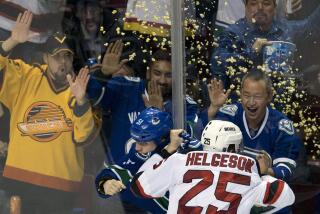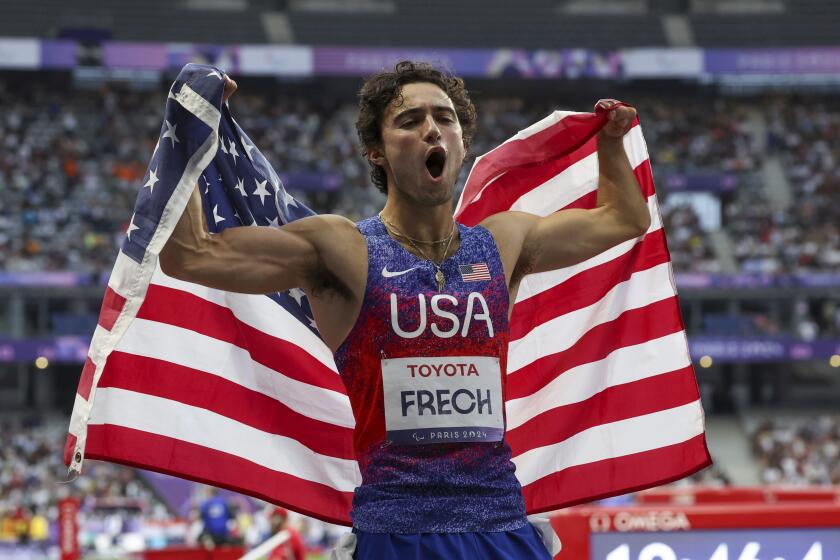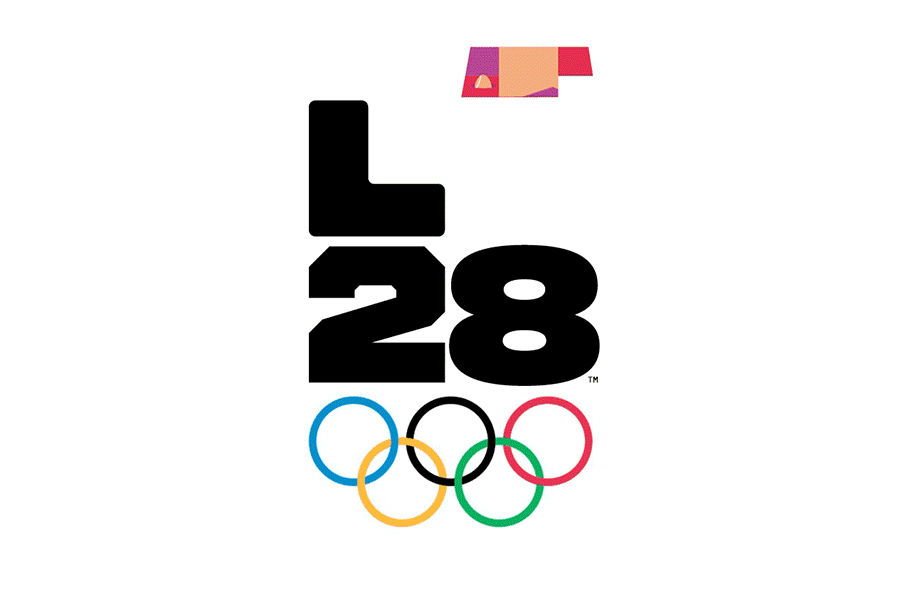Holes Filled, but Canyon Remains at U.S. Captain
Three obvious wrongs were corrected Monday when Lou Lamoriello, general manager of the U.S. Olympic team, added Pat LaFontaine, Bryan Berard and Bill Guerin to the squad for the Nagano Games.
With a gold medal so realistic a prospect, Lamoriello--also general manager of the New Jersey Devils--put aside his still-simmering differences with Guerin and decided the right wing’s scoring knack and speed on the wider international ice surface were more important than nursing a grudge over Guerin’s recent contract dispute.
Lamoriello also deserves applause for choosing Berard over old standby Phil Housley, who plays for Olympic Coach Ron Wilson’s Washington Capitals. The fewer choices made out of political correctness, the better.
Berard is a strong skater and should help the power play, which could be vital in a short tournament. He’s one of only three players who weren’t on last year’s triumphant World Cup team, and he provides a new dimension to a group of veteran defensemen that was clearly the best in the World Cup.
This is the most formidable group of American hockey players ever assembled. It has the most international experience--five players played in previous Olympics--and it has a strong psychological bond formed during the World Cup. Team Canada was tailored to match the Americans’ strengths, maybe the best measure of how far hockey has progressed here.
Canada had to make changes after its World Cup loss, but a few of its choices were baffling. Underachiever Keith Primeau was chosen for his size, but Kris Draper, who is smaller, plays much bigger. Theoren Fleury over Claude Lemieux? Debatable. Only Eric Lindros’ much-rumored dislike of Mark Recchi could explain leaving the durable and productive winger off the team.
The biggest controversy was the omission of Mark Messier, but equally questionable is the selection of Lindros as captain. He lacks credibility because he hasn’t won anything. Mario Lemieux anointed him the torchbearer for the next generation of superstars, but Lindros hasn’t earned that honor yet. Assistant captains Steve Yzerman and Joe Sakic are quiet by nature, leaving Canada without the fiery, charismatic leader Messier was for so many years.
Messier’s absence can be justified by his fading in the World Cup and playoffs and concern that, at 37, he couldn’t be effective in six tense games over 10 nights. Bob Clarke, Team Canada’s general manager, wanted power forwards to out-muscle John LeClair, Jeremy Roenick and Keith Tkachuk of the U.S.; diligent checkers like Rob Zamuner to neutralize the U.S. team’s speed and center Joe Nieuwendyk to counter the U.S. team’s size. He has grinders who will play key roles with a fair amount of finesse, and he figured he didn’t need Messier.
He figured wrong, because he found no one to replace Messier’s unique ability to inspire teammates by subtle word or grand deed. That, in the end, may be more telling than a scoring deficit up front.
How many Stanley Cups has Wayne Gretzky won without Messier? None. How many Olympic gold medals will Gretzky win without Messier? The same number.
NOT A FIGHTING CHANCE
Ken Dryden, president and general manager of the Toronto Maple Leafs, apparently will succeed in getting his team’s move to the Eastern Conference accelerated to next season, one of several matters to be considered when the NHL’s Board of Governors convenes today in Florida. However, his other crusade--to eliminate fighting--is destined for failure.
Like it or not, fighting is too ingrained in the game to be eradicated. Controlled, yes. The NHL has imposed sanctions that have virtually eliminated bench-clearing brawls. And most fights should be broken up sooner. But in a sport involving constant physical contact and ever-bigger players confined in a small area, fights will never disappear, no matter the penalty.
Even King Coach Larry Robinson, a friend of Dryden’s, scoffed at his former teammate’s idea.
“Is it realistic? No. But I don’t think [fighting] should be glorified, such as the rematch between [Detroit’s Darren] McCarty and [Colorado’s Claude] Lemieux,” Robinson said, referring to a grudge that erupted in a fight three seconds into the pair’s last meeting.
“[But] what’s wrong with two combatants going at it fair and square? Nobody ever gets hurt. Well, not seriously.”
Tim Leiweke, the Kings’ president and an alternate governor, said he would oppose a move to ban fighting. As proof that even knowledgeable fans deem it part of the game, he cited the ovations given Boston rookie Joe Thornton--who has yet to score a point--after he got into a brawl last week.
“I think they have it to the point where it’s in control, but it’s as much a part of the tradition of hockey as anything,” Leiweke said. “Fans like the physical part of the game. I’m not condoning violence, but this is a physical game and fighting is part of the honor of sticking up for your teammates.”
As Conn Smythe, boss of the Toronto Maple Leafs, said in the 1930s, “We’ve got to stamp out this kind of thing or people will keep buying tickets.”
CAPITAL IMPROVEMENT
Good riddance to the US Airways Arena, which was no better when it was called the Capital Center. Dark, bland and stuck in the middle of nowhere, it was the site of its final NHL game Wednesday.
The Capitals will debut at the MCI Center in Washington, D.C., on Friday, and Coach Wilson expects more to change than the team’s address.
“There’s going to be a better perception of the Capitals,” he said. “A player who came here would think, ‘Oh, I’m going to the Capitals and going to be at the [isolated] Greenbelt Marriott.’ Now, they’re going to come in and stay at the Mayflower or Four Seasons and be three blocks from the Capitol. It’s going to be a hip place and a better building to play in. It’s bigger than the United Center but with glitz.”
CAN’T WE ALL BE FRIENDS?
It’s difficult to explain and impossible to excuse recent incidents in which Chris Simon and Craig Berube of Washington were suspended for using offensive language against black players.
But it’s worth asking if a climate of intolerance is, even in a small part, created by Don Cherry, the “Hockey Night in Canada” commentator who frequently impugns the character of European players.
It’s a short leap from insulting someone’s nationality to insulting an opponent’s ethnic or racial background. Cherry legitimizes such insults, and as long as he’s idolized, his prejudices will be copied and taken to ugly extremes.
The Capitals plan to send their players through sensitivity training to educate them about what’s offensive. Fine. Will players also be cautioned against calling French-Canadians “frogs” or calling Swedes “chicken?” And how do you police language on the ice, where emotions run high? It’s a minefield, and the NHL must step carefully.
SLAP SHOTS
On the Board of Governors’ agenda is a motion to delay the start of the season several weeks on the theory fans aren’t ready for hockey Oct. 1, so they don’t buy tickets. . . . The Edmonton Oilers, concerned over Andrei Kovalenko’s failure to score a goal until Sunday after he had scored 32 last season, sent him to a doctor for a blood test. Nothing medically wrong was found, but the Oilers are putting him on a strict conditioning program.
Finally, a good personnel move by the San Jose Sharks: They hired former standout defenseman Doug Wilson to be their director of pro development. He had been working for the NHL Players Assn. . . . The Detroit Red Wings are fed up with teammate Sergei Fedorov, an unsigned free agent. Remembering he once said he got little respect because of his nationality and would get more credit “if my name was Sam Jones,” they’re calling him Sam, and not in a complimentary context. “Sam Jones is in Moscow now and I hear Sam Jones is losing a lot of money,” Vyacheslav Kozlov told Detroit reporters last week.
Restricted free agent Oleg Tverdovsky signed with Hamilton of the American Hockey League for almost nothing. The team pays his insurance, meal money, hotel room on the road and mileage to the rink. . . . The Pittsburgh Penguins sold the naming rights to the Civic Arena to a power company, but it will always be the Igloo to true hockey fans.
More to Read
Go beyond the scoreboard
Get the latest on L.A.'s teams in the daily Sports Report newsletter.
You may occasionally receive promotional content from the Los Angeles Times.










